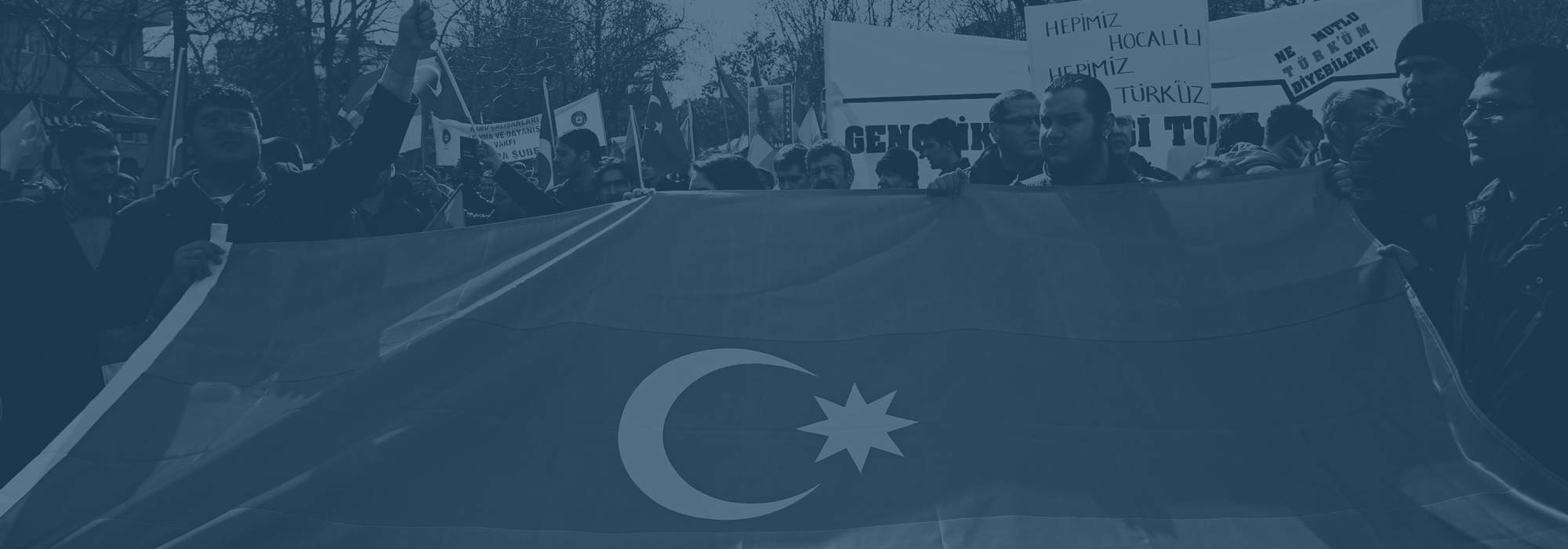Earlier this week, we looked at what will happen after the Chinese downturn. We noted that the world’s exporters — from Germany and South Korea to Saudi Arabia — are facing a crisis. On Tuesday, we noted that Russia is looking to the West, as risk of internal instability grows, and the following day we looked at Kazakhstan’s currency troubles. These ripples are the outcome of the interlocking crises of China and falling world energy prices. Today, we are also seeing the next domino in the exporters’ crisis falling: Azerbaijan.
Azerbaijan, a major energy exporter, is experiencing significant economic disruptions. Located on the western shores of the Caspian Sea, Azerbaijan is a significant strategic player due to its geographic position in the Caucasus, a region where Iran, Turkey and Russia have historically competed for influence.
According to the International Monetary Fund, the fiscal breakeven oil price per barrel for Azerbaijan is $93.60 — triple the current price. As a result of falling prices, Baku allowed the country’s currency, the manat, to float on Dec. 21. The currency then lost nearly half its value in one day. This move came after the country devalued the manat by about 34 percent in February 2015. The immediate result of the December decision to float the currency was a shortage in dollars and a spike in consumer prices, including the price of medicine and food. On Jan. 12, protests over unemployment and price hikes broke out in at least four different districts. The following day, protests continued, as police reportedly used tear gas and rubber bullets to subdue the demonstrations and arrested some protesters and opposition figures. Eyewitnesses told Radio Free Europe that military units were deployed in at least one district. It remains unclear how many people were protesting, but demonstrations were spread throughout the country, indicating that they were hardly isolated events.
On Jan. 13, as police and military units were busy making arrests and dispersing protesters, it is highly notable that Azerbaijani President Ilham Aliyev was busy, not calming down Azerbaijan’s citizens, but rather meeting with Charles Kupchan, Director of European Affairs at the U.S. National Security Council. Pro-government Azerbaijani media gave vague, positive accounts of the meeting, highlighting security cooperation between the two countries. Security cooperation was likely discussed, but in reality, Aliyev was likely inquiring about ways the U.S. can help his regime overcome a double predicament.
Aliyev is facing a growing problem, as low energy prices are shaking the very foundations of his regime. Baku’s strategy, both for safeguarding the Aliyev regime’s position of power and promoting the country’s interests abroad, has thus far revolved around the country’s ample energy resources. Internally, the Aliyev regime could use energy revenues to promote stability and win some political support, or at least the population’s acquiescence. Externally, Baku used energy exports and planned pipeline projects to maintain balanced relations with both Russia and the West. In particular, Azerbaijan’s ability to export natural gas to Europe was touted as a way to reduce Europe’s dependency on the Kremlin for energy supplies.
The fall in energy prices has undermined Baku’s ability to continue implementing these strategies. The low prices put pressure on the country’s currency. There are now reports of unpaid wages, in addition to the higher prices for consumers, raising the possibility of significant unrest. Baku has already signaled over the past several months that it feels the regime is under threat. There has been a large purge of officials in the Ministry of National Security, as well as continued crackdowns on opposition figures and a village known as the center of radical Shia Islamism in Azerbaijan. In a speech on Jan. 10, Aliyev pledged reforms and criticized what he called “artificial” price hikes, but with such low energy prices and deteriorating economic conditions, and with the regime’s position highly dependent on energy revenue, the government’s ability to implement meaningful and successful structural changes is highly constrained.
Baku is also grappling with a strategic dilemma when it comes to the country’s position in the region. The downing of a Russian military jet by Turkish forces created tensions between two countries that have historically competed for influence in the Caucasus. Azerbaijan has a close relationship with Turkey, but Baku has worked to maintain cordial and cooperative ties with Moscow, despite Russia’s alliance with and military presence in Armenia, Azerbaijan’s archrival in the Caucasus. At the same time, in an attempt to counteract the Kremlin’s position in the region, the Aliyev government has also developed its relationship with Washington. Russia’s own economic crisis, and Turkey’s preoccupation with Syria, may be drawing Azerbaijan even closer to the U.S.
As it watches the economic and political turmoil engulfing Eurasia, and as internal instability grows in Azerbaijan, the Aliyev regime is likely becoming increasingly nervous about both its own position and Azerbaijan’s role in the region. Azerbaijan, like many of the world’s commodity export-dependent countries, is losing some of its wealth. Those losses are now beginning to threaten internal stability as well.





 The Geopolitics of the American President
The Geopolitics of the American President